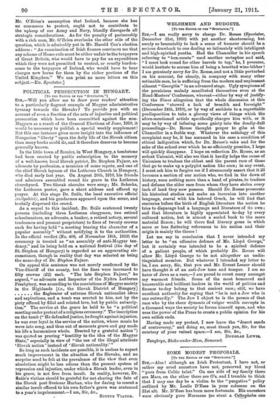POLITICAL PERSECUTION IN HUNGARY.
[TO THE EDITOR OP THE " SPECTATOR."'
SIR,—Will you allow me to draw your readers' attention to a particularly flagrant example of Magyar administrative tyranny towards the Slovaks ? To provide you with an account of even a fraction of the acts of injustice and political persecution which have been committed against the non- Magyars as a result of the General Elections of June, 1910, it would be necessary to publish a special weekly supplement ! Bat this one instance gives more insight into the influence of Hungarian " liberty " upon the daily life of the Slovak citizen than many books could do, and it therefore deserves to become generally known.
In the little town of Szenicz, in West Hungary, a tombstone had been erected by public subscription to the memory of a well-known local Slovak patriot, Dr. Stephen Fajnor, an advocate by profession, a musician of some repute, and one of the chief Slovak laymen of the Lutheran Church in Hungary, who died early last year. On August 20th, 1910, his friends and admirers assembled round his grave in the Lutheran churchyard. Two Slovak chorales were sing; Mr. Sekerka, the Lutheran pastor, gave a short address and offered up prayer. At this stage Dr. &Ale, the local executive official (szolgabir6), and his gendarmes appeared upon the scene, and brutally dispersed the crowd.
As a sequel to this incident, Dr. Szale sentenced twenty persons (including three Lutheran clergymen, two retired schoolmasters, an advocate, a banker, a retired notary, several tradesmen and peasant proprietors) to fines of twenty crowns each for having held " a meeting bearing the character of a popular assembly" without notifying it to the authorities. In the official verdict (No. 400, of November 18th, 1910) the ceremony is treated as " an assembly of anti-Magyar ten- dency," and its being held on a national festival (the day of St. Stephen of Hungary) is regarded as an aggravating cir- cumstance, though in reality that day was selected as being the name-day of Dr. Stephen Fajnor.
On appeal this sentence was not merely confirmed by the Vice-Sheriff of the county, but the fines were increased to fifty crowns (L2) each. " The late Stephen Fajnor," he argued, " as advocate and Inspector of the Nyitra Lutheran Presbytery, was according to the convictions of Magyar society in the Highlands [i.e., the Slovak District of Hungary]
the flagbearer of extreme Slovak nationalist ideas and aspirations, and a tomb was erected to him, not by the piety offered by filial and related love, but by public subscrip- tion." The service at the grave he held to be "a political meeting under pretext of a religious ceremony." The inscription on the tomb (" He defended justice, he fought against injustice, he was ever loyal in the service of the nation, whose music he wove into song, and thus out of moments grave and gay made his life a harmonious whole. Erected by a grateful nation ") was quoted as proving "hostility to the idea of the Magyar State," especially in view of " the use of the illegal attribute ' Slovak nation' instead of ' Slovak nationality.' "
So long as such incidents are possible, it is useless to expect much improvement in the situation of the Slovaks, and no surprise need be felt at the prevalence of the view that even absolutism might be less odious than the present system of repression and injustice, under which a Slovak leader, even in his grave, is not free from insult. In reality, however, Dr. &tile's victims should be grateful for not sharing the fate of the Slovak poet Svetozar Hurban, who for daring to resent a similar insult offered to his own father's grave was sentenced










































 Previous page
Previous page